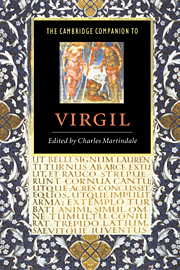Book contents
- Frontmatter
- Contents
- List of illustrations
- List of contributors
- Preface
- 1 Introduction: ‘The classic of all Europe’
- Part 1 Translation and reception
- Part 2 Genre and poetic career
- Part 3 Contexts of production
- Part 4 Contents and forms
- 16 Virgil's style
- 17 Virgilian narrative (a) Story-telling
- 17 Virgilian narrative(b) Ecphrasis
- 18 Approaching characterisation in Virgil
- 19 Sons and lovers: sexuality and gender in Virgil's poetry
- 20 Virgil and tragedy
- 21 Envoi: the death of Virgil
- Dateline compiled by Genevieve Liveley
- List of works cited
- Index
- Plates
19 - Sons and lovers: sexuality and gender in Virgil's poetry
from Part 4 - Contents and forms
Published online by Cambridge University Press: 28 May 2006
- Frontmatter
- Contents
- List of illustrations
- List of contributors
- Preface
- 1 Introduction: ‘The classic of all Europe’
- Part 1 Translation and reception
- Part 2 Genre and poetic career
- Part 3 Contexts of production
- Part 4 Contents and forms
- 16 Virgil's style
- 17 Virgilian narrative (a) Story-telling
- 17 Virgilian narrative(b) Ecphrasis
- 18 Approaching characterisation in Virgil
- 19 Sons and lovers: sexuality and gender in Virgil's poetry
- 20 Virgil and tragedy
- 21 Envoi: the death of Virgil
- Dateline compiled by Genevieve Liveley
- List of works cited
- Index
- Plates
Summary
One way or another, sexuality has always been a topic of interest to Virgil's readers. In his life of the poet, Suetonius reports that Virgil inclined toward the love of boys and that he addressed a favourite named Alexander under the name 'Alexis' in the Second Eclogue; Martial pretends to believe that it was this rosy-lipped young slave who excited the poet to compose his Aeneid (Mart. 8.5.11-20). It is only in the past two decades, however, that scholarly interest has begun to focus on the topic of 'sexuality and gender' in antiquity. The 'and' here covers a whole range of questions - for example, how is sexual difference represented in antiquity, how is it implicated with other kinds of socially constructed differences, is 'sexuality' a discrete concept or is it still awaiting its 'invention'? I will begin this essay by surveying Virgil's Eclogues (with side-glances at the Aeneid) to see what light they can shed on some of these issues. I will then turn to my central project, which is to sketch some of the ways sexual and gender differences help to articulate Virgil's poetry.
- Type
- Chapter
- Information
- The Cambridge Companion to Virgil , pp. 294 - 311Publisher: Cambridge University PressPrint publication year: 1997
- 26
- Cited by

